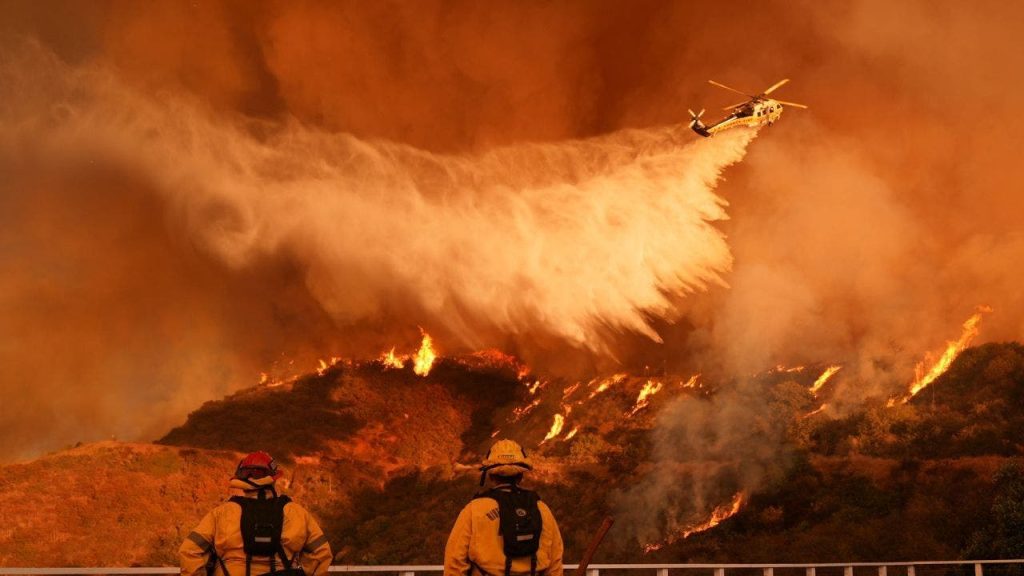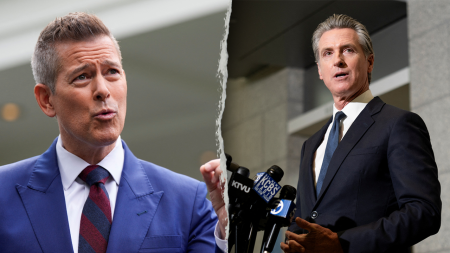The California political landscape is ablaze with controversy surrounding the devastating Los Angeles wildfires, with Democrats seeking to hold oil and gas companies financially accountable for the damages. Senator Scott Wiener’s newly proposed “Affordable Insurance and Climate Recovery Act” aims to empower wildfire victims and insurance companies to sue fossil fuel giants, arguing that their emissions directly exacerbated the fires and therefore should bear the financial burden of recovery. This legislation aligns with a broader Democratic narrative attributing the escalating frequency and intensity of wildfires to climate change, a stance that has drawn criticism from those who point to state and local policies as contributing factors.
The bill’s introduction has ignited a fiery debate over responsibility for the disaster. Supporters of the legislation argue that fossil fuel companies, as major contributors to greenhouse gas emissions, should shoulder the financial consequences of climate change-related events like wildfires. They contend that Californians, already burdened by high taxes and escalating insurance costs, should not be solely responsible for covering the immense costs of recovery. This argument resonates with those who see climate change as a critical factor in the increasingly destructive nature of natural disasters, emphasizing the need for corporate accountability in addressing the escalating costs associated with extreme weather events.
Conversely, critics of the bill argue that it deflects attention from what they perceive as flawed state and local policies that exacerbated the wildfires’ severity. They cite budget cuts to the Los Angeles Fire Department, inadequate vegetation management, and water management decisions prioritizing endangered species over ample water resources for firefighting as significant contributing factors. This perspective emphasizes the immediate responsibility of local and state government in mitigating fire risks and ensuring adequate resources for prevention and response. Critics see the focus on fossil fuel companies as a political maneuver to divert attention from these policy shortcomings, effectively scapegoating the oil and gas industry while avoiding accountability for local mismanagement.
The timing of the bill, coming immediately after the fires, has fueled speculation about political motivations. Critics argue that Democrats are attempting to shift blame away from their own policies, which they believe have contributed to the severity of the disaster. They point to reductions in fire department funding, inadequate vegetation management, and water policies that prioritize endangered species as evidence of mismanagement that exacerbated the fires. This critique highlights a broader tension between environmental protection and resource allocation, questioning whether current policies strike the right balance between preserving natural ecosystems and safeguarding human communities from natural disasters.
Further complicating the issue is the intervention of former President Donald Trump, who signed an executive order overriding certain California environmental regulations related to water availability. Trump argued that these regulations, specifically the Endangered Species Act’s protections for the Delta smelt, had negatively impacted water resources available for firefighting. This action has been met with mixed reactions, with some applauding the move as necessary to prioritize human safety, while others criticize it as an overreach of federal power and a potential threat to endangered species. The executive order underscores the complex interplay of federal and state authority in environmental management and disaster response.
The debate surrounding the California wildfires extends beyond the immediate crisis, touching on fundamental disagreements about the role of government, corporate responsibility, and environmental policy. The proposed legislation reflects a broader push to hold fossil fuel companies accountable for the costs of climate change, a movement gaining traction in various legal and political arenas. However, the controversy surrounding the bill highlights the challenges of assigning blame and responsibility in complex situations where multiple factors, including both natural phenomena and human actions, contribute to disaster. The ongoing debate will likely shape not only California’s approach to wildfire management but also the broader national conversation about climate change and corporate responsibility.










